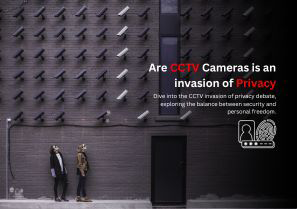We all know that CCTV is the best way to get the security you want but is it even permissible to record the activity, people or locations around you? If yes, what are the limitations of CCTV surveillance? And privacy rights of individuals?
If you are someone looking for answers to these questions, this blog is for you. Here we are going to discuss all of the legal boundaries regarding CCTV usage.

Legal clause for CCTV installation
Data Protection:
The use of CCTV often involves the collection and storage of personal data, which is subject to data protection laws.
These laws regulate the collection, storage, and use of personal data and require organizations to implement appropriate technical and organizational measures to protect this information.Privacy:
The use of CCTV raises privacy concerns, as it involves the recording of individuals in public and private spaces.
In many countries, there are privacy laws that regulate the use of CCTV and set limits on the collection and use of personal information.
These laws may include consent from individuals before collecting and using their personal data, or to limit the amount of personal information collected to what is necessary for the specific purpose.Human Rights:
The use of CCTV can also impact human rights, such as the right to freedom of expression, the right to freedom of assembly, and the right to privacy.
In some cases, the use of CCTV may be seen as a restriction on these rights and may require a justification, such as a legitimate security or safety concern.Notification:
In many countries, there are laws that require organizations to provide notice to individuals when CCTV is in use in public spaces. This can be done through signs or other forms of notification, such as public announcements.
This is to ensure that individuals are aware of the presence of CCTV and can make an informed decision about their behavior and personal information.Retention:
There are laws that specify the length of time that CCTV footage can be stored and the conditions under which it can be deleted. These laws vary depending on the jurisdiction and the purpose of the footage.
In some cases, the footage may need to be retained for a specified period of time, while in others it may need to be deleted immediately after use. It is important to comply with the applicable laws and regulations regarding the retention of CCTV footage.
To understand it further here is two important questions which comes in mind as we go through the above mentioned points.

Is workplace CCTV monitoring ethical?
The ethics of workplace CCTV monitoring are debatable, as it raises concerns about privacy, trust, and the balance of security and individual rights.
Many businesses find that workplace CCTV monitoring can help to improve safety and security by discouraging theft and assisting with workplace investigations.
On the contrary, it can be argued that the use of CCTV in the workplace invades employees’ privacy, fosters distrust, and can be used for surveillance and monitoring of employee behavior that goes beyond what is required for security.
Without delving into that debate, we can say that the ethical use of workplace CCTV monitoring is dependent on the specific context and circumstances. To avoid legal problems, organizations should take the following precautions:
- Organizations should have clear policies and procedures in place, and these policies should be communicated to employees.
- Only use CCTV monitoring in proportion to and necessary for the workplace’s specific security or safety needs.
- Companies must ensure that the use of CCTV complies with data protection and privacy laws, and that employees’ personal information is protected and used responsibly and ethically.
As we can see, the ethical use of workplace CCTV monitoring only necessitates a careful balancing of the needs for security and privacy. It also conveys a positive attitude towards organisations and assists them in being transparent, responsible, and respectful of employees’ rights.

Are security cameras a violation of privacy?
The use of security cameras is frequently viewed as a violation of privacy because it involves the recording and monitoring of individuals in public or private spaces.
The extent to which security cameras violate privacy, however, is determined by a number of factors, including the location of the cameras, the purpose of the monitoring, and the laws and regulations that govern their use.
In many cases, the use of security cameras in public areas such as streets, parks, and shopping malls is regarded as less of a violation of privacy than the use of cameras in private areas such as homes or workplaces.
This is due to the fact that people have a lower expectation of privacy in public places, and cameras are typically used for security and safety.
Even in public places, however, the use of security cameras may raise privacy concerns if the cameras are used for purposes other than security, such as monitoring individual behaviour or collecting personal information.
Security cameras can be seen as a more serious violation of privacy in private spaces, such as homes or workplaces, because people have a higher expectation of privacy in these settings.
Cameras used in these areas may be subject to privacy laws and regulations that limit the collection and use of personal information.

Conclusion
In conclusion, the use of CCTV raises a number of important legal considerations, including data protection, privacy, human rights, notification, and retention.
These considerations are crucial to ensure the privacy and security of individuals, as well as the protection of the personal information collected and stored by the CCTV system.
Organizations using CCTV must be aware of the various laws and regulations governing its use, and must comply with these requirements to avoid legal consequences.






